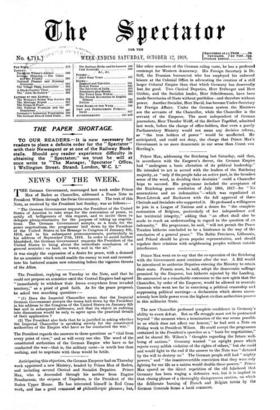The new Chancellor professed complete confidence in Germany's ability to
avert defeat. But as tge struggle must not be protracted beyond "the moment when a termination of the war seems possible to us which does not affect our honour," he had sent a Note on Friday week to President Wilson. He could accept the programme contained in the President's speeches as a "basis for negotiations," and he shared Mr. Wilson's "thoughts regarding the future well, being of nations." Germany wanted "an upright peace which rejects every selfish violation of the rights of others," but she could and would fight to the end if the answer to the Note was "dictated by the will to destroy us." The German people still had "mighty powers," and "the incontrovertible conviction that they were only fighting for our life as a nation would double these powers." Prince Max spared us the direct repetition of the old falsehood that Germany has been waging a defensive war, but it is implied in that closing phrase of a thoroughly disingenuous oration, on which the deliberate burning of French and Belgian towns by the German Generals forma a lurid comment.


































